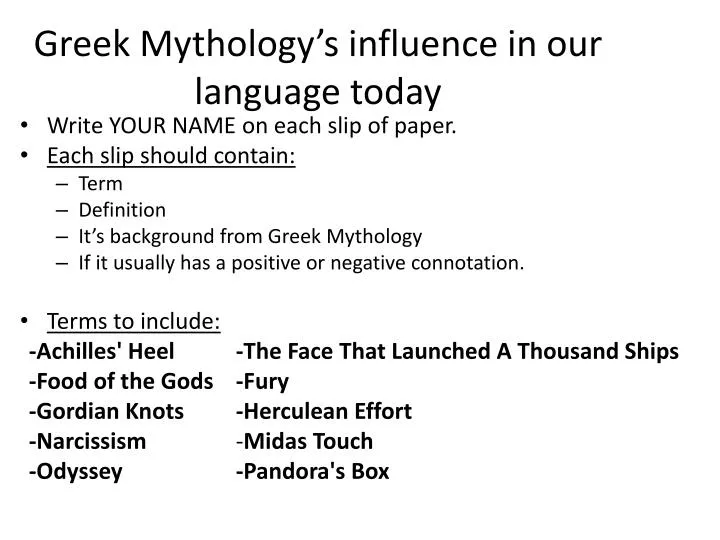Unraveling The Tapestry Of Greek: Exploring The Impact Of Greek On The English Language
Unraveling the Tapestry of Greek: Exploring the Impact of Greek on the English Language
Related Articles: Unraveling the Tapestry of Greek: Exploring the Impact of Greek on the English Language
Introduction
In this auspicious occasion, we are delighted to delve into the intriguing topic related to Unraveling the Tapestry of Greek: Exploring the Impact of Greek on the English Language. Let’s weave interesting information and offer fresh perspectives to the readers.
Table of Content
Unraveling the Tapestry of Greek: Exploring the Impact of Greek on the English Language

The English language, a vibrant tapestry woven from threads of various origins, owes a significant debt to Ancient Greek. This influence, known as "Greek influence on English," extends far beyond mere vocabulary. It has shaped the very structure and spirit of the language, leaving an indelible mark on its grammar, literature, and even our modern understanding of the world.
The Foundation of Knowledge: Greek and the Scientific Revolution
The Renaissance, a period of intellectual rebirth in Europe, witnessed a resurgence of interest in classical Greek literature and philosophy. This revival was instrumental in fueling the Scientific Revolution, a period of groundbreaking discoveries that transformed our understanding of the universe.
Greek provided the foundation for scientific terminology. Terms like "atom," "hypothesis," "planet," and "biology" are derived from Greek words, reflecting the language’s ability to express complex scientific concepts. The adoption of Greek terms not only facilitated communication within the scientific community but also established a universal framework for scientific discourse, transcending national boundaries.
A Legacy of Literature: Greek Influence on English Literature
Beyond science, Greek literature has left an enduring imprint on English literature. Authors like Shakespeare, Milton, and Wordsworth were deeply influenced by Greek epics, tragedies, and philosophical writings. They drew inspiration from the themes of heroism, fate, and the human condition, enriching their own works with universal truths and timeless narratives.
The influence of Greek mythology is particularly evident in English literature. Characters like Prometheus, Pandora, and the Olympian gods have become archetypes, their stories resonating with readers across generations. Their presence in literature serves as a testament to the enduring power of Greek mythology to illuminate the human experience.
Grammar and Structure: Greek Influence on English Grammar
While English grammar differs significantly from Greek grammar, the latter has subtly influenced English syntax and structure. The use of prepositions, the formation of compound words, and the development of certain grammatical tenses can be traced back to Greek influences.
Moreover, the concept of "parts of speech" – nouns, verbs, adjectives, etc. – finds its roots in Greek grammatical theory. This framework, established by ancient Greek grammarians, provided a foundation for analyzing and understanding the structure of language, laying the groundwork for later linguistic developments.
Beyond Words: The Enduring Impact of Greek on English Culture
The influence of Greek on English extends beyond the realm of language and literature. It has shaped our cultural landscape, our understanding of democracy, and our approach to education.
The concept of democracy, a cornerstone of modern Western societies, originates from the Greek word "demos," meaning "people," and "kratos," meaning "rule." The Athenian democracy, a system of government where citizens actively participated in decision-making, served as a model for later democratic movements and institutions.
Greek education, emphasizing critical thinking, logic, and rhetoric, has left an enduring legacy on Western education systems. The focus on developing critical thinking skills and engaging in reasoned discourse remains a core principle of modern education, reflecting the enduring influence of Greek pedagogical methods.
Understanding Greek Influence: A Key to Unlocking the Language
By understanding the profound influence of Greek on English, we gain a deeper appreciation for the richness and complexity of the English language. It reveals the interconnectedness of cultures and the enduring power of ideas to transcend time and geography.
Frequently Asked Questions
Q: What are some common English words derived from Greek?
A: Some common English words derived from Greek include:
- Autobiography: From "autos" (self) and "bios" (life)
- Democracy: From "demos" (people) and "kratos" (rule)
- Geography: From "ge" (earth) and "graphein" (to write)
- Philosophy: From "philos" (love) and "sophia" (wisdom)
- Symphony: From "syn" (together) and "phone" (sound)
Q: How did Greek influence English grammar?
A: While English grammar differs from Greek, the latter has subtly influenced English syntax and structure. For example, the use of prepositions, the formation of compound words, and the development of certain grammatical tenses can be traced back to Greek influences.
Q: What is the significance of Greek mythology in English literature?
A: Greek mythology has provided a rich source of inspiration for English authors. Characters like Prometheus, Pandora, and the Olympian gods have become archetypes, their stories resonating with readers across generations.
Q: How has Greek education influenced English education?
A: The Greek emphasis on critical thinking, logic, and rhetoric has left an enduring legacy on Western education systems. The focus on developing critical thinking skills and engaging in reasoned discourse remains a core principle of modern education, reflecting the enduring influence of Greek pedagogical methods.
Tips for Further Exploration
- Explore Greek mythology: Read classic Greek myths or watch films and television shows based on these tales.
- Study Ancient Greek literature: Read works by Homer, Sophocles, and Plato to gain a deeper understanding of Greek thought and culture.
- Examine the etymology of English words: Trace the origins of English words to their Greek roots to appreciate the language’s historical development.
- Engage in reasoned discourse: Practice critical thinking and logical reasoning to emulate the Greek emphasis on intellectual inquiry.
Conclusion
The impact of Greek on English is undeniable. It has enriched the language with vocabulary, shaped its grammar, and provided a foundation for scientific, literary, and cultural advancements. Understanding this influence allows us to appreciate the interconnectedness of cultures and the enduring power of ideas to transcend time and geography. By delving into the tapestry of Greek influence on English, we gain a deeper understanding of the language’s richness and complexity, revealing the vibrant history that lies at its heart.








Closure
Thus, we hope this article has provided valuable insights into Unraveling the Tapestry of Greek: Exploring the Impact of Greek on the English Language. We appreciate your attention to our article. See you in our next article!